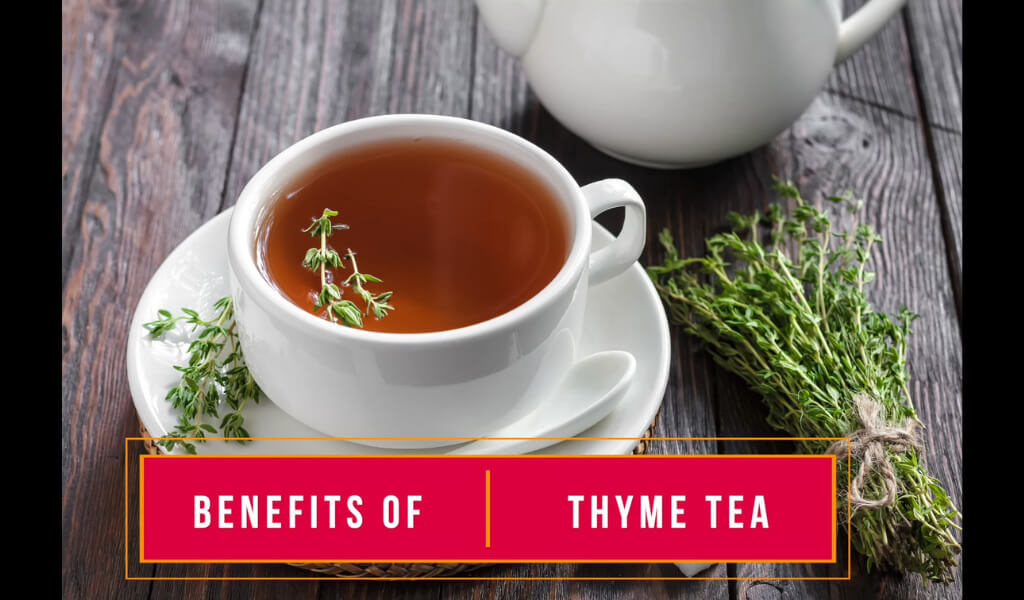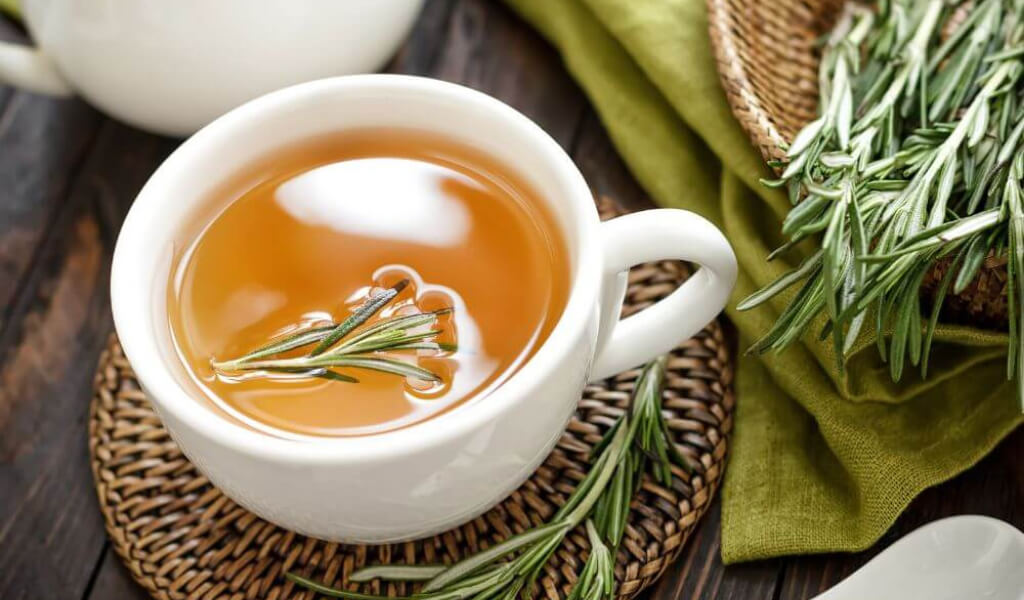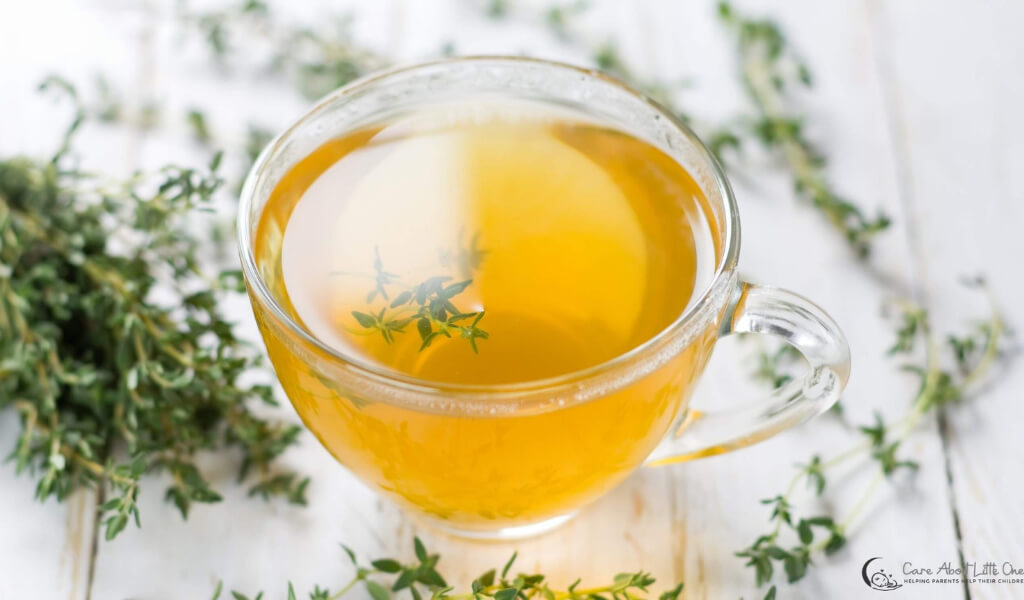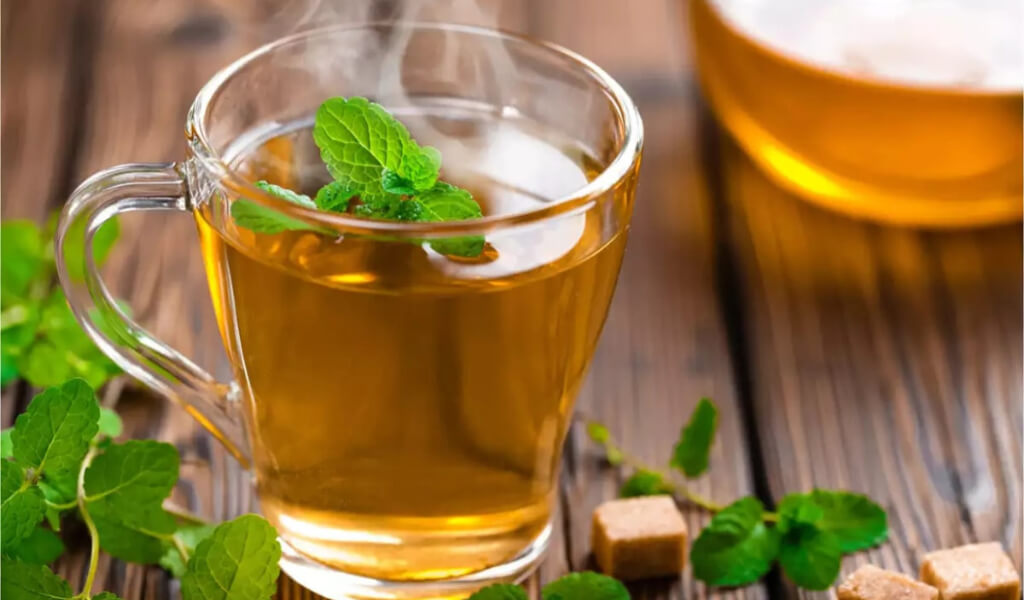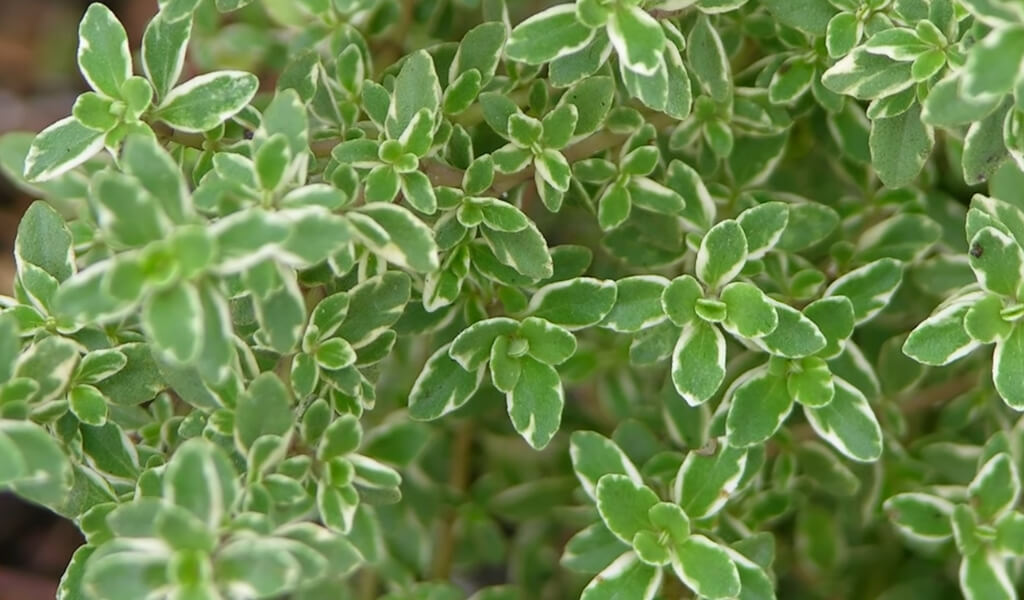Hello, fellow tea lovers! I can’t contain my excitement as I share the wealth of Thyme tea benefits with you today.
Did you know that thyme has been used for its medicinal properties since ancient times?
It is fascinating how this time-honored herb continues to be a wellness staple.
Whether you’re sipping it for pleasure or health, Thyme tea has something to offer everyone.
What is Thyme Tea?
Thyme tea, brewed from thyme leaves, has a rich history dating back to ancient Egypt. It’s renowned for its numerous health benefits, such as relieving cold symptoms, aiding digestion, and promoting better sleep. This herbal infusion has been a trusted remedy for centuries.
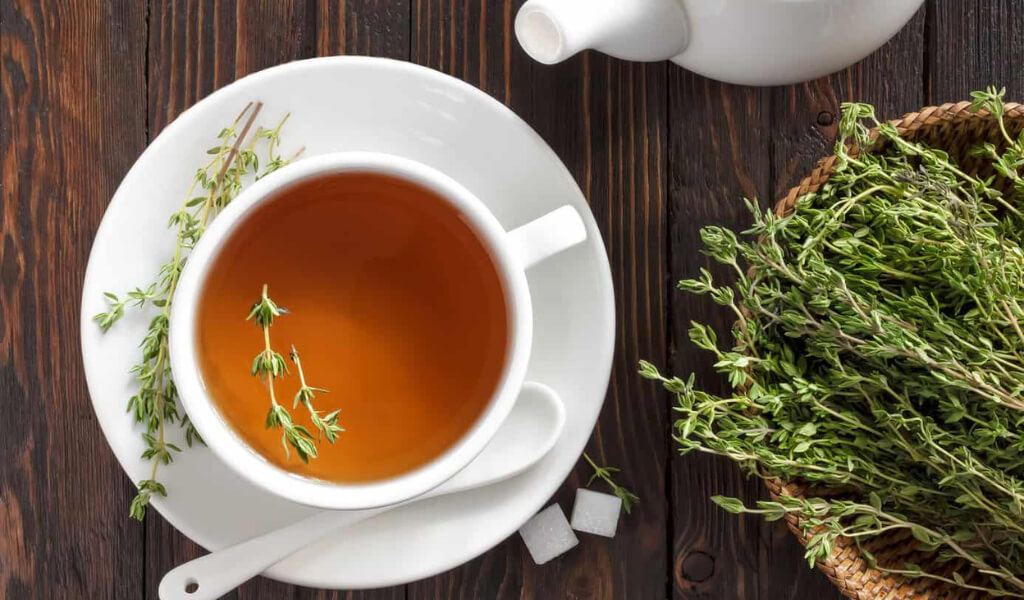
However, the list of commendations doesn’t end here! Recent research has uncovered additional advantages for your health. Thyme Tea, abundant in anti-inflammatory properties, can enhance your immune system, support weight loss efforts, reduce cholesterol and blood sugar levels, and potentially contribute to preventing cancer.
Fresh thyme isn’t just flavorful and fragrant; it’s a rich source of nutrients. One teaspoon of fresh thyme contains 160mg of vitamin C and various essential minerals like manganese, magnesium, zinc, potassium, calcium, and iron. Enjoying Thyme Tea is a delightful and easy way to boost your nutrition.
How much Thyme tea should I drink?
Drinking Thyme Tea in moderation is recommended, typically 1-2 cups daily. Paying attention to your body’s response and consulting a healthcare provider for personalized advice can also be helpful.
Thyme Tea Nutrition
One of the standout components of thyme is thymol, a compound known for its antiseptic and anti-fungal properties. In addition, thyme leaf tea is enriched with essential nutrients including potassium, vitamins A and C, and magnesium.
Let’s break it down further. A one-teaspoon serving of fresh thyme contains:
- Calories: 0.8
- Protein: 0 grams
- Fat: 0 grams
- Carbohydrates: 0.2 grams
- Fiber: 0.1 grams
Although thyme has a low calorie count, it is rich in nutritional value, making it a tasty enhancement to your tea and a beneficial ingredient for your health. We will delve into its therapeutic properties in the forthcoming sections, driven by the assortment of vitamins and minerals it contains.
- What are common Rosemary tea side effects
- Benefits of Mugwort tea
- What is Spearmint Tea? Nutrition, Benefits, Side Effects & More
- What is Mullein Tea? Ultimate Benefits & Side Effects For Enthusiasm
- Sip, Savor, and Discover: All about Tea and Its Types
What Are The Benefits of Thyme Tea
From ancient apothecaries to today’s modern kitchens, Thyme Tea has earned its stripes as a medicinal marvel. The tapestry of nutrients we discussed earlier weaves itself into the benefits of drinking thyme water that can touch nearly every aspect of our well-being.
Now, let’s dive into the specifics and thoroughly explore each benefit. 🍵💚
Can Support Manage Blood Pressure
With its abundant baicalein and apigenin, Thyme tea effectively relaxes blood vessels and enhances brain circulation, offering a soothing touch to calm nerves and reduce blood pressure.
High blood pressure, a notorious villain in the story of heart diseases and strokes, meets its match in Thyme Tea. A riveting 2016 study painted a promising picture – participants with mild to moderate hypertension experienced noteworthy reductions in both systolic and diastolic blood pressure.
The individuals responsible for this success story are thymol and carvacrol, which are substances found in thyme. Think of them as miniature massage therapists, alleviating stress in your blood vessels and creating a path for unhindered blood flow. As your heart experiences a reduced workload and exhales a sigh of relief, your blood pressure decreases.
Thyme Tea for Cough
According to research, chemicals found in thyme can assist to break down mucus, allowing it to move more easily through the respiratory tract while offering cough alleviation. Moreover, thyme has antiseptic and local anesthetic effects, which are particularly beneficial for oral and throat health.

An intriguing aspect of thyme is its ability to promote tracheal cilia movement, which helps in mucus secretion, essential for clearing out phlegm and reducing inflammation in the throat.
In a 2013 study, a thymol-based nasal spray showed promise in reducing coughing compared to saltwater or a placebo spray, particularly after exposure to capsaicin, a natural cough-inducer.
Thyme compounds such as thymol and carvacrol may also help ease chest congestion. Although more extensive research is needed, this initial evidence indicates the potential role of Thyme Tea in providing cough relief and respiratory support.
Thyme Tea for Digestion
Making Thyme Tea could be wise for individuals looking to support their digestive health. Thyme tea boasts a wealth of oleanolic acid, which has been observed to alleviate diarrhea and soothe abdominal pain when consumed promptly.

Moreover, proper digestion, which is crucial for breaking down food into nutrients for the body, can be bolstered by a recipe for Thyme Tea. Thanks to its carminative properties, it’s particularly helpful for relieving common digestive discomforts such as bloating, gas, and indigestion.
These characteristics help alleviate stomach cramps and enhance digestive function by stimulating the smooth muscle contractions in the digestive tract, primarily due to thyme’s volatile oils.
Additionally, Thyme Tea’s rich antioxidant profile can be beneficial in managing blood sugar levels. The polyphenols found in the tea have demonstrated the ability to lower glucose levels, making it a potentially valuable addition to the diet of individuals with diabetes.
Thyme Tea is a noteworthy beverage for overall health through its combined digestive and blood sugar-regulating benefits.
Thyme Tea for Weight Loss
Embarking on a weight loss journey? Thyme tea might be your new best friend. One of the many benefits of drinking thyme water is its potential to contribute to weight loss. A study in 2015 showed that extracts of thyme could help reduce body fat mass, thus playing a role in weight management.
How does it achieve this? The answer lies in the rich polyphenols found in thyme. These compounds are believed to interact with hormones that regulate metabolism, increasing the body’s fat-burning abilities.
Furthermore, Thyme Tea contains catechins that prevent digestive enzymes from converting carbohydrates into sugars. This reduces sugar absorption, resulting in a lower calorie intake, which is crucial for weight loss. Additionally, Thyme tea can enhance your satiety and assist in controlling cravings. Drinking a cup of this fragrant tea before meals can lead to quicker fullness and reduced food consumption.
Thyme Tea for Inflammation
One remarkable benefit of Thyme Tea is its ability to combat inflammation. While inflammation is the body’s natural defense against injuries and infections, chronic inflammation can be detrimental, often leading to arthritis and cardiovascular diseases.
Thyme tea is rich in antioxidants, which play a crucial role in reducing inflammation by lowering oxidative stress on cells. This particularly benefits those battling inflammatory autoimmune diseases such as rheumatoid arthritis or multiple sclerosis.
The duo behind thyme tea’s anti-inflammatory prowess is thymol and carvacrol, two naturally occurring compounds in thyme.
These compounds have shown promise in fighting inflammation, particularly by targeting the COX-2 enzyme, which is often elevated during inflammation. They achieve this by inhibiting inflammatory cytokines, which are signals the body uses to intensify the immune response.
Additionally, the anti-inflammatory properties of thyme tea can alleviate joint pain and stiffness, providing much-needed relief for those struggling with inflammatory conditions.
Sipping on thyme tea could be an enjoyable and natural way to keep inflammation in check and support overall well-being.
Benefits of Thyme Tea for Lungs
Among the array of benefits thyme tea offers, its positive impact on lung health stands out. Thyme, celebrated for its expectorant qualities, excels in eliminating mucus from the airways, which is especially beneficial in combating bronchitis.
Moreover, thyme’s inherent antimicrobial properties make it a potent defense against infections and an enhancer of respiratory functions.
A 2014 study revealed that thyme extracts can help alleviate respiratory symptoms such as asthma, bronchitis, and flu by reducing mucus thickness, improving lung oxygenation, and reducing coughing.
Consider incorporating thyme tea into your routine to breathe easier and support your lung health. As a natural decongestant, it works wonders in clearing phlegm and irritants from the nose and throat.
Thyme tea benefits for skin
It can also help protect the skin from free radical damage, which can lead to premature aging. Thyme’s anti-inflammatory properties may also help calm red and irritated skin, relieving rashes and other irritations.
With abundant anti-inflammatory and antimicrobial properties, wild thyme tea benefits for the skin are striking. Specifically, it combats bacterial infections and alleviates inflammation, making it a formidable ally against acne and eczema.
What makes thyme so effective? Its components – thymol, linalool, and cymene – play a vital role in disinfection and sterilization, curbing skin itching and combatting issues like dermatophytosis and actinomycosis.
Moreover, thyme is a treasure trove of antioxidants. Laden with vitamin C, it not only keeps acne in check by clearing out pores but also shields the skin from the havoc wreaked by free radicals, thus preventing premature aging. Red, inflamed skin doesn’t stand a chance against thyme’s soothing anti-inflammatory compounds.
Interestingly, a 2010 study unveiled the impressive antibacterial prowess of thyme essential oil against P. acnes bacteria, notorious for causing acne. However, it’s worth noting that more research is required to cement these findings.
Thyme Tea for Multiple Sclerosis
Navigating the intricate terrain of chronic illnesses such as Multiple Sclerosis (MS), we often take comfort in nature’s remedies, like thyme. MS is a condition where the immune system betrays, damaging nerve cell insulation, resulting in various symptoms like muscle weakness, blurred vision, fatigue, and coordination problems.
Emerging studies point towards the potential benefit of thyme tea for MS warriors. Rich in compounds adept at tempering inflammation, tea with thyme could be an invaluable ally in your MS journey. Add to that its potential for enhancing cognitive function by bolstering oxygen flow to the brain and sparking alertness, and you have a herbal infusion worth considering.
Remember, while we’re waiting on more research to cement thyme tea’s status as an effective MS aid, it’s already a natural way to keep some MS symptoms at bay. Your cup of thyme tea could be more than just a soothing drink; it could be a step towards better managing MS.
May Increase Yeast Infection
Yeast infections, characterized by itching, burning, and inflammation, are often caused by a fungus called Candida albicans. Thyme tea, with its antifungal properties, could aid in combating these infections. The beneficial impact of thyme on yeast infections can be attributed to thyme’s inherent antifungal and antiviral properties, which are known to keep Candida albicans in check.
Interestingly, a study conducted in 2021 provided some scientific basis for thyme’s traditional use in treating yeast infections. The research found that thyme oil was effective against Candida albicans, including strains resistant to fluconazole, a commonly prescribed medication for yeast infections. It was observed that even low doses of thyme oil had fungicidal properties.
However, it’s important to note that more research is needed, especially on human subjects, to firmly establish thyme tea as a reliable treatment for yeast infections. Until then, thyme tea remains a promising, yet not fully proven, natural option for those seeking to manage yeast infections through alternative means.
May Get Benefits for Fibromyalgia
Fibromyalgia, a chronic ailment affecting up to 5% of the global population, manifests in widespread muscle pain, relentless fatigue, and disrupted sleep, severely impairing one’s quality of life.
With its anti-inflammatory prowess, Thyme tea may come to the rescue by mitigating pain and discomfort associated with fibromyalgia. Moreover, thyme tea harbors compounds like linalool, which is believed to foster relaxation and, in turn, enhance sleep quality for those grappling with fibromyalgia.
While it’s crucial to acknowledge that further research is needed to confirm thyme tea’s efficacy in combatting fibromyalgia, incorporating this herbal beverage into one’s routine may offer a natural avenue for symptom management and overall well-being.
Thyme tea benefits for hair
Thyme tea has antiseptic and antifungal properties, making it a potent ally for hair health. It combats dandruff, strengthens strands, and stimulates growth. Rich in phenolic acids and flavonoids, it enhances capillary circulation in the scalp, promoting lustrous, robust tresses.
Treats Herpes
Most people suffer through cold sores once in their life, which is caused by the herpes virus. When they appear over the skin, they can be contagious, may cause itching and soreness, and very painful till healing. The antiviral attributes of Thyme Tea can be very beneficial to cure herpes lesions close to the mouth and finally save people from a great deal of embarrassment.
What Are The Main Thyme Tea Side Effects
While thyme tea is cherished for its health benefits, consuming it with caution is essential as it can have some side effects and interact with medications.
Dehydration
Thyme tea acts as a diuretic; excessive consumption can lead to dehydration, resulting in headaches and dizziness.
Allergic Reactions
Individuals allergic to thyme or related plants like basil and oregano may experience skin sensitivity, nausea, heartburn, diarrhea, and vomiting upon consuming thyme tea.
Caution with Essential Oils
Thyme essential oil is highly concentrated and can be toxic if undiluted. Consuming it can cause a significant drop in blood pressure. Consult a doctor before using thyme essential oil, especially if you are on medication or pregnant.
Toxin Intake
Though thyme tea is fragrant and beneficial, excessive intake can damage the liver and spleen due to the toxins present in thyme. Limit the daily consumption not to exceed 5g. Those with hypoglycemia, high blood pressure, or women during menstruation and pregnancy should avoid thyme tea.
Migraines
Carvacrol and thymol in thyme have been linked to triggering migraines. Those with persistent migraines should consult a doctor before consuming thyme tea.
Nausea and Stomach Pain
Overconsumption of thyme tea can lead to nausea, dizziness, vomiting, and stomach pain.
Pregnancy Precautions
Though thyme is considered safe as a spice, its use as tea is different. Thyme tea might stimulate menstruation, leading to early pregnancy loss. Pregnant and breastfeeding women should consult a physician before consuming thyme tea.
Drug Interactions
Thyme tea can interact with antidepressants, sedatives, blood pressure medications, and medications for neurodegenerative diseases. Consult your doctor for advice before adding thyme tea to your regimen if you are on medication.
How to Make Thyme Tea
Making thyme tea can be done using fresh or dried thyme, and for those who love experimenting, incorporating thyme essential oil adds an exciting twist.
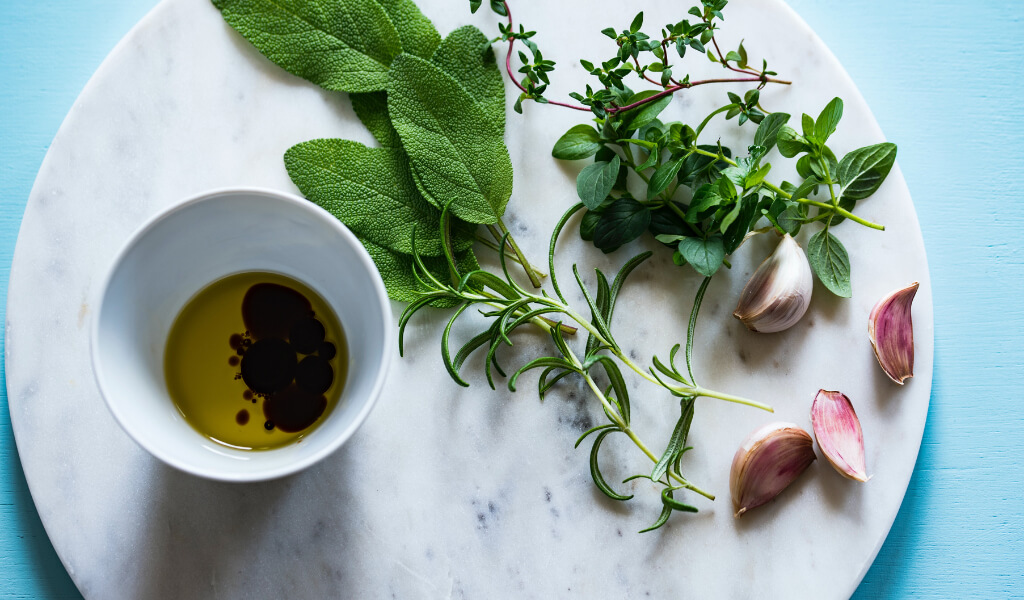
Below is a step-by-step guide on how to make thyme tea:
Using Fresh Thyme
1. Select Fresh Thyme
Start by picking a few sprigs of fresh thyme from your garden or purchase from a local store.
2. Boil Water
In a kettle or saucepan, bring water to a boil.
3. Prepare Thyme
While boiling, wash the fresh thyme sprigs and place them in a teapot or mug.
4. Steep
Pour the boiling water over the thyme sprigs and let it steep for about 5-10 minutes. The steeping time can be adjusted depending on how strong you like your tea.
5. Strain and Serve
Strain the tea into a cup and enjoy it hot. You can add honey or lemon for additional flavor.
Using Dried Thyme
1. Measure Dried Thyme
Take about one teaspoon of dried thyme leaves. You can use loose leaves or place them in a tea infuser.
2. Boil Water
As with fresh thyme, bring water to a boil in a kettle or saucepan.
3. Steep
Place the dried thyme in a cup or teapot and pour the boiling water over it. Let it steep for around 5-10 minutes.
4. Strain and Serve
Strain the tea into a cup. You can enhance the flavor by adding honey, lemon, or a slice of ginger.
What Is Variation with Thyme Essential Oil
You can add a drop of thyme essential oil to the tea for an even more potent thyme flavor. However, be cautious, as thyme oil is potent. It’s important to use food-grade essential oil and consult a healthcare provider if you have any health conditions or concerns.
Conclusion
Thyme tea, a treasure trove of health benefits, can be a remarkable addition to your daily regimen.
Its advantages are extensive, from boosting immunity, aiding digestion, and managing blood pressure to potentially alleviating chronic conditions like Multiple Sclerosis and Fibromyalgia.
Moreover, it benefits hair growth and can help treat yeast infections. However, moderation is key, as excessive consumption can have side effects. It is also advisable for individuals with specific health conditions or allergies to consult a healthcare provider before incorporating thyme tea into their diet.
In a nutshell, what is thyme tea good for? Thyme tea is a flavorful beverage and a health boon worthy of exploration.
Thanks for Spiritea Drinks
FAQs
Who should avoid thyme?
Individuals allergic to thyme or herbs like basil and oregano should avoid thyme. Additionally, pregnant women, individuals on high blood pressure medication, anti-clotting drugs, or those with liver issues should exercise caution. Consulting a healthcare professional before consuming thyme, especially in tea or essential oil, is advisable for these groups.
Can I drink thyme tea every day?
Yes, thyme tea can be consumed daily, but in moderation. Its antioxidant properties and various health benefits make it a worthy addition to your daily routine. However, excessive consumption may lead to dehydration or other side effects. It’s best to monitor your body’s response and adjust your intake accordingly.
Can I drink thyme tea at night?
Drinking thyme tea at night can be beneficial, especially due to its compounds like linalool which promote relaxation. It may also help in improving sleep quality. However, if you are sensitive to herbs or prone to frequent urination, it is wise not to consume it too close to bedtime.
Can I drink thyme tea before bed?
Yes, you can drink thyme tea before bed. Its calming properties help in winding down and preparing your body for restful sleep. However, it’s important to consume it in moderation to avoid disrupting sleep due to the diuretic nature of the tea.
Is thyme tea good for kidneys?
Thyme tea can benefit kidney health due to its diuretic properties, which can help flush toxins. However, overconsumption may lead to dehydration which isn’t good for the kidneys. Consuming thyme tea in moderation is best, and consult a healthcare provider if you have kidney-related health issues.
How many times should I drink thyme tea?
Drinking thyme tea 1-2 times daily is ideal for most people. It’s important not to exceed the recommended amount to avoid potential side effects like dehydration or allergies.
Who should not drink thyme tea?
Individuals with allergies to thyme or similar herbs, those taking certain medications such as blood pressure drugs, pregnant women, and individuals with liver issues should avoid drinking thyme tea or consult a healthcare professional before doing so.
Can I make thyme tea with dried thyme?
You can make thyme tea with dried thyme. Using dried thyme is a convenient and effective way to enjoy the health benefits of thyme tea. Add a teaspoon of dried thyme to a cup of boiling water, let it steep for about 5 minutes, strain, and enjoy.
I’m Shanna, creator of Spiritea Drinks. I’m all about teaching people to grow their own food, tea, cook what they harvest, and eat with the seasons.

